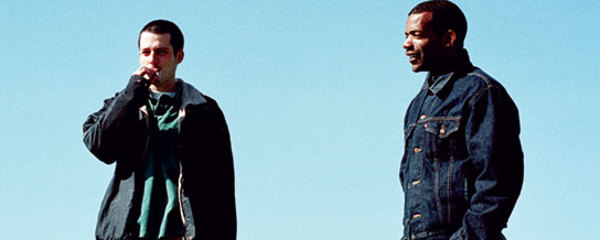Border Crossing: Soul Survivors
It’s been nearly three years since Boder Crossing‘s debut, Ominous, was released in the UK. […]
Border Crossing: Soul Survivors
It’s been nearly three years since Boder Crossing‘s debut, Ominous, was released in the UK. […]

It’s been nearly three years since Boder Crossing‘s debut, Ominous, was released in the UK. After their first label, RG, went out of business back in 2004 and the duo-which now consists of DJ/producer Seorais (pronounced “shorus”) Graham and turntablist Alex Angol-renegotiated their rights, French imprint Recall picked up the slack and gave Ominous its proper credit. The hip-hop collective has grown up a bit since then-in actuality, grown down (after last year’s departure of engineer/producer Paul Mulvey)-but Ominous is just as close to their hearts as it ever was.
“A lot of [the album], to me, still sounds totally fresh,” explains Graham. “Our production and writing skills have developed over time, so we might feel that some of [Ominous is] naïve, but irrespective of that, the emotions and motive behind it means it still sounds fresh…I wouldn’t say there’s been a switch [in sound], but there’s been a definite growth.
“It took us a long time to gain our confidence back,” Graham says of Mulvey’s absence. But they haven’t missed a beat. Graham and Angol both took up the writing and production reigns for their upcoming disc (slated for a late 2006 release), which features vocals from Ricky Rankin, up-and-comer Vicky Virtue, and Five Deez’ Fat Jon-a border crosser in his own right, with whom the duo shares a strong artistic connection. “There’s been a kind of meeting of minds with Jon,” says Graham. “There’s definitely a sense of kindred spirits with people like Five Deez and even, I’d say, other artists that we admire like Little Brother.”
There’s an old soul element to Ominous that’s undeniable, but hardly surprising-both current Border Crossing members came up through the ranks of the UK’s hip-hop and soul club circuit. Angol was a DJ in Renegade Soundwave and Radical Crew. (“They were like our idols as kids,” says Graham, also a veteran DJ.) They’re also suckers for nostalgia, as evidenced by refrains like, “Original heads in the area/Let’s take it back to ’93/…the era of the true MC” on “Original Heads,” where Rockwell’s subdued rap anchors a bass-heavy groove complimented by a rhythmic, razor-sharp hi-hat.
One senses the duo could take things back even further, to the days when London’s punk and reggae scenes crossed to create one of Britain’s most politically interesting times for music. “That spirit never died,” exclaims Angol. “If you look at West London now, you see we’re doing an album and the guy above us is working on an Aswad album at the same time.”

